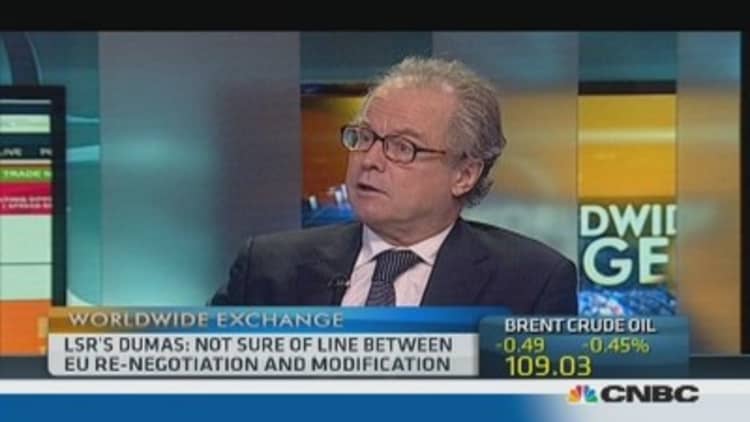When Eleanna Malemi graduated with a degree in European and international studies in Athens in 2010, she did not expect to be working in a bar four years later.
But after countless job interviews and unpaid internships, she was forced to take work as a waitress in order to fund further study – a last-ditch effort to make herself more attractive to the sparse number of Greek companies actually looking to fill jobs.
"Since 2010 I have been searching for a job based on my studies, but it's been hard to find anything except non-paid jobs," she told CNBC.
Read MoreEuro zone unemployment holds, factory uptick widens
But Malemi, who lives in Athens, is one of the lucky ones – at least she has a job, albeit not her dream one. Countless others in the country do not.
Greece is emblematic of the euro zone's persistent unemployment crisis, with figures published Friday showed that, once again, Greece has the highest level of unemployment in the region, at 26.7 percent. Youth unemployment in the country is especially bad, at a staggering 56.8 percent.
"Young people here are disappointed because after so many years of studying and hard work, they feel lost and cannot make their dreams about the future come true," Malemi said.
"We are angry because we are an educated people; we have a lot to offer society and we can't do anything about it."
Her comments come a day after thousands of angry workers took to the streets in Greece – and in cities across Europe - to rally against austerity reforms on International Workers Day.
'Wiped out the country's human capital'
The euro zone was hard hit by the global financial crash of 2008, which a couple of years later caused a sovereign debt crisis across the 18-country group. As a result, many euro zone countries – including ItaIy, Spain, Portugal and Greece - have undergone tough spending cuts and reforms. These austerity measures rapidly slammed the brakes on the countries' economies, sending jobless numbers spiraling.

Wanna be in my gang: Is EU membership worth it?
As a result, a high number of young people in particular have resorted to leaving their home countries to find work abroad.
Vasilis Kitsos, who has a post-graduate degree, currently lives in Greece, but has previously worked the U.S. and Latvia. He told CNBC he's planning to leave his home country again soon .
"Greece's (unemployment situation) mainly affects youth and high-skilled jobs," Kitsos said. "It's wiped out the country's human capital and society's self-esteem and dynamics."
But it's not just Greece that is struggling with persistently high unemployment. Friday's data, published by the European Union's statistics office Eurostat, showed that unemployment in the euro area remained at 11.8 percent in March – just off the record high of 12 percent recorded one year ago.
And although the number of unemployed people fell by 22,000 to 18.91 million in March 2014, the level of joblessness has remained stubbornly close to this level for four months in a row.
Costas Milas, professor of finance at the University of Liverpool, said he was "cautiously optimistic" that the worst of the euro zone's joblessness crisis was over. But he warned that the region's unemployment rate was unlikely to return to its pre-2008 rate of around 7 percent any time soon.
One reason for this was the issue of long-term unemployment, he said, which remained "unacceptably high."
Across the European Union, 47.5 percent of unemployed people in 2013 had been so for over a year, according to data published last month by Eurostat. In Greece, this figure rose to 67.5 percent.
"The longer the time unemployed stay out of work, the more discouraged they become," Milas told CNBC.
How real is the euro zone recovery?
"At the same time, whether we want it or not, potential employers appear more willing to offer interviews (let alone hire) to unemployed who stay out of work for a shorter spell."
Radical changes?
Guglielmo Meardi, professor of Industrial Relations at Warwick Business School, said the persistently poor labor market performance - especially in southern Europe – raised questions over these countries' policies.
"It is by now clear that freezing wages and liberalizing labor markets, by themselves, do not help," he told CNBC, stressing that disparity between the countries continues.
Unemployment in the euro zone is highest in Greece and Spain, where it is at 25.3 percent. By contrast, in western European countries like Austria and Germany, unemployment is at just 4.9 percent and Germany 5.1 percent respectively.
"The EU has to take some difficult decision, either on plans to support growth in depressed regions through demand, and not only supply policies, or on socially and politically sustainable ways to facilitate worker mobility between regions," Meardi added.


